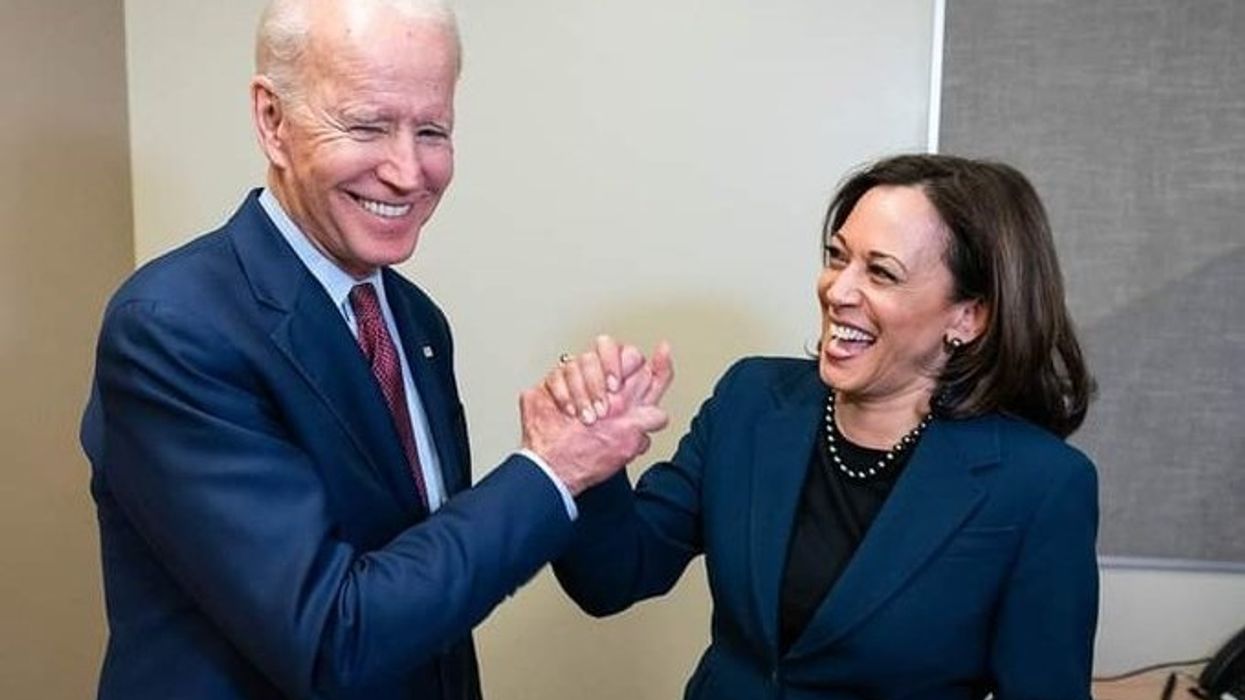Can Kamala Harris Break A Tied Senate Vote On Biden's Supreme Court Nominee?

Pesident Joe Biden And Vice President Kamala Harris
With a Democrat in the White House and Democrats effectively controlling the Senate, Republicans might have figured they were bound to lose the coming Supreme Court battle. But last Thursday, they found a glimmer of hope in one of their favorite places: the opinion pages of The Wall Street Journal.
Democrats have shown that if they stick together, they can get their way in the Senate without a single Republican. They have 50 senators, as does the GOP. But in cases of a tie, the vice president, as president of the Senate, casts the deciding vote. Kamala Harris has done it several times, just as Mike Pence did.
But the Journal unearthed an article, written in 2020 by the renowned Harvard constitutional law professor Laurence Tribe, contending that in the case of a Supreme Court nomination, the vice president should have no vote.
Noting that no judicial appointment was ever decided this way until 2018, Tribe argued that allowing this practice would "break the Framers' careful constitutional structure." He cited Alexander Hamilton who in The Federalist Papers said that "if the Senate should be divided, no appointment could be made."
If Tribe is right, Joe Biden could find himself powerless to fill the vacancy left by the departing Stephen Breyer with a justice agreeable to Democrats. Republicans in the Senate could block any nominee until such time as they regain a majority in the Senate. The crowning irony would be doing it on the authority of one of the nation's premier liberal legal minds.
But embracing this argument would require Republicans to discard one of the fundamental concepts of conservative constitutional interpretation. Known as textualism and championed by the late Justice Antonin Scalia, it says that the most important consideration in such matters is the plain language of the Constitution.
Constitutional language doesn't get much plainer than Article I, Section 3: "The Vice President of the United States shall be President of the Senate, but shall have no Vote, unless they be equally divided." If the Senate is equally divided, the vice president has a vote. The provision mentions no exceptions.
Tribe, however, notes that the Constitution says judicial nominees are subject to "the advice and consent of the Senate." If the Senate "cannot muster a majority to 'consent' to the appointment," he says, the framers meant for it to fail.
But what the framers had in mind doesn't necessarily support this argument. Hamilton may have agreed, but one of the experts Tribe cites, Samuel Morse, acknowledges that only a minority of those at the Constitutional Convention took that view.
Michael McConnell, an influential conservative legal scholar at Stanford and a former federal appeals court judge who was appointed by George W. Bush, is not persuaded by Tribe's argument. The provision giving the vice president a vote, he told me, "applies whenever the Senate is equally divided. If Section 3 did not apply to the advice and consent function, then the vice president would not only not be able to vote, but would not preside, which is contrary to historical practice."
There is also the matter of longstanding historical understanding and practice, which count for a lot in applying the Constitution. Vice presidents have cast many deciding votes for executive branch nominees, going back at least to 1832. Betsy DeVos became secretary of Education in 2017 only because Mike Pence broke a tie vote on her nomination.
Nor would Harris be the first vice president to determine the fate of a judicial nominee. In 2018, Pence voted to confirm Jonathan Kobes for the Eighth Circuit Court of Appeals.
Tribe is correct that "no vice president in our history has ever cast a tie-breaking vote to confirm an appointment to the Supreme Court." But that fact is not as revealing as it may appear. To his knowledge, says McConnell, until 2018 "there was never an occasion when the issue arose."
That's because close votes for Supreme Court nominees are a rare and mostly recent phenomenon. For much of our history, they were usually confirmed by voice vote, the functional equivalent of unanimous approval. Stephen Breyer, chosen by Bill Clinton, carried the Senate by 87-9.
If Republicans hope to block Biden's nominee, they will have to unite all their senators and coax at least one Democrat to join them. If not, Kamala Harris will be ready to cast the deciding vote, and nothing is going to stop her.
Follow Steve Chapman on Twitter @SteveChapman13 or at https://www.facebook.com/stevechapman13. To find out more about Steve Chapman and read features by other Creators Syndicate writers and cartoonists, visit the Creators Syndicate website at www.creators.com.
- Abruzzo Confirmed as NLRB Top Lawyer by Harris Tiebreak (1) ›
- Democrats have precedent for a speedy Supreme Court confirmation ›
- Pence Becomes First VP To Break Senate Tie Over Cabinet ... ›
- Can Harris Break a Tie on a Supreme Court Confirmation? ›
- U.S. Senate: Votes to Break Ties in the Senate ›
- Can the Vice President Break the Tie on a Supreme Court ... ›








